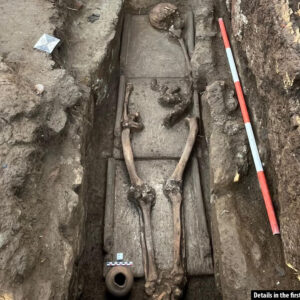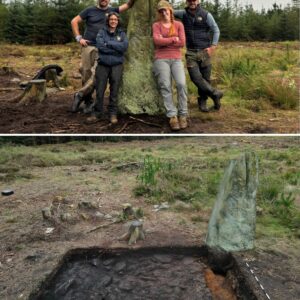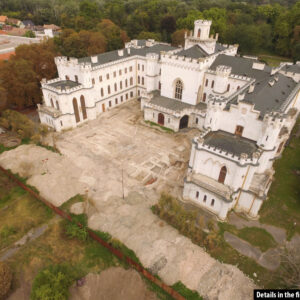In the heart of the Black Sea region, the ancient city of Hadrianopolis continues to reveal its secrets. Recent excavations have uncovered a remarkable Roman-era bronze filter, shedding light on the sophisticated consumption habits of the past. This discovery not only highlights the ingenuity of ancient societies but also offers a glimpse into the everyday lives of people who lived over a millennium ago. Let’s dive into the fascinating world of ancient technology and the cultural significance of this ancient beverage filter.
Hadrianopolis: A Center of Agricultural Activity and Technological Innovation
Hadrianopolis, often referred to as the “Zeugma of the Black Sea,” has a rich history that spans thousands of years. Situated in the fertile region of the Black Sea, the city was a significant agricultural hub during the 5th century AD. Evidence from recent excavations reveals that the city was known for cultivating a wide variety of fruits, including pomegranates, apples, and grapes, as well as grains like wheat and barley. These agricultural products formed the backbone of the local economy, allowing Hadrianopolis to thrive as a center of trade, culture, and religious activity.
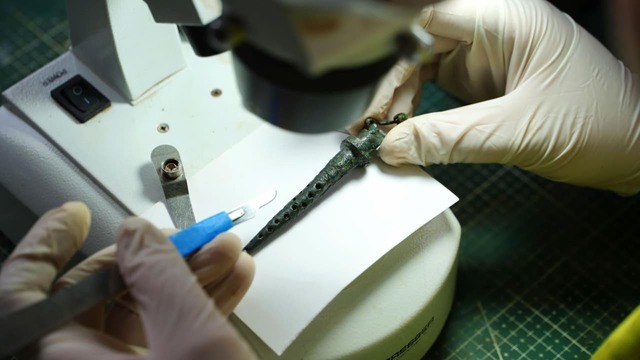
In addition to its agricultural prowess, Hadrianopolis was a place of remarkable technological innovation. As an important cultural and economic center, it was not only a location for farming but also a place where people crafted advanced tools and technologies to improve their daily lives. The recent discovery of a bronze beverage filter in the city provides a striking example of how the inhabitants of Hadrianopolis used technology to refine their consumption habits.
Video
Watch this short video to discover a rare Roman-era bronze filter uncovered in Hadrianopolis, Türkiye, shedding light on ancient technology and daily life.
Discovery of the Bronze Filter: An Ingenious Beverage Purification Tool
The bronze filter, uncovered during excavations at Hadrianopolis, is an exceptional artifact that provides a glimpse into the sophisticated ways in which ancient people purified their beverages. Measuring approximately 9.2 centimeters in length, the filter features a conical shape with small perforations designed to remove impurities from liquids. This small object, likely used during the Roman and Byzantine periods, was likely employed to filter out solid residues from drinks like fruit juices, wines, and other fermented beverages.
What makes this filter even more fascinating is its design. Unlike modern disposable filters, the bronze filter was not meant to be thrown away after a single use. Instead, it featured a carrying loop, indicating that it was intended for repeated use. This suggests that the ancient inhabitants of Hadrianopolis were not only concerned with improving the quality of their drinks but also with maintaining cleanliness and hygiene in their daily lives. The use of a reusable, washable filter reflects a culture that valued both practicality and sustainability, much like modern consumers who opt for reusable straws and water bottles.
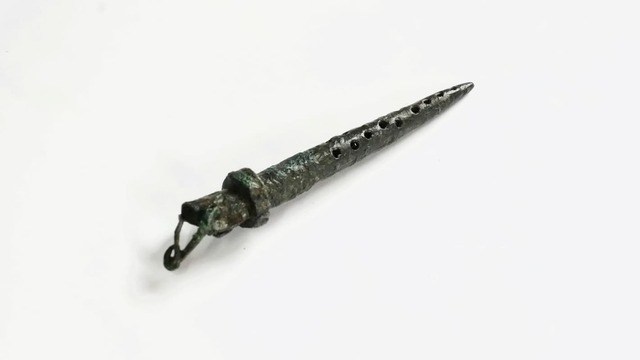
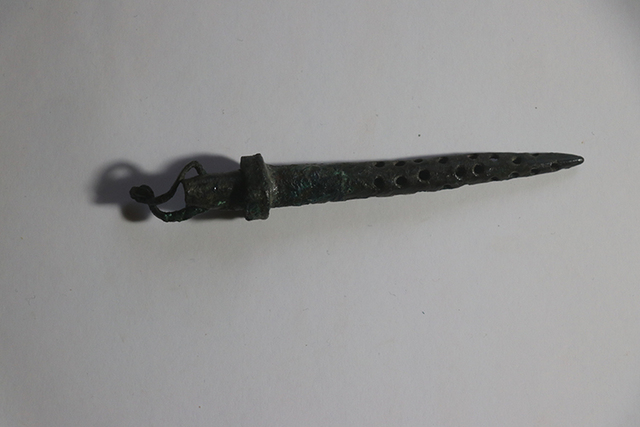
The filter’s perforated design likely served to separate impurities from liquids, ensuring that beverages were both cleaner and more pleasant to drink. Paired with straws made from plant materials such as reeds or cane, the filter would have allowed for a more refined drinking experience, making it an essential tool in the daily life of ancient Romans and Byzantines.
Advanced Consumption Habits: How the Filter Was Used
The discovery of the bronze filter provides valuable insight into ancient consumption habits, particularly the way people in Hadrianopolis enjoyed their beverages. The filter was not an isolated object; it was part of a broader drinking culture that relied on natural materials for both utility and comfort. Archaeological evidence suggests that straws made from reeds or cane were commonly used during this period, and the filter was likely attached to the end of these straws to purify the liquids being consumed.
This combination of tools—the straw and the filter—allowed the people of Hadrianopolis to enjoy a more sophisticated and healthy way of drinking. Unlike the modern, disposable plastic straws we use today, the straws of ancient times were crafted from natural materials, making them both environmentally friendly and functional. The addition of the bronze filter elevated the experience, ensuring that beverages were free from unwanted solids and impurities.
The filtering process would have been particularly important for drinks like fruit juices, which were commonly consumed in Hadrianopolis. Fruit juices, along with wines and fermented beverages, were essential to the diet of the city’s inhabitants, and the bronze filter would have played a crucial role in ensuring that these drinks were clean and enjoyable. This small, but significant, piece of technology highlights the ingenuity and attention to detail that characterized ancient Roman and Byzantine society.
A Step Forward in Archaeological Understanding: The Role of the Filter in Ancient Society
The discovery of the bronze beverage filter in Hadrianopolis is not only a testament to the technological advancements of ancient people but also a reflection of the broader cultural and social practices of the time. The ability to purify beverages was just one example of the sophisticated technologies used in everyday life. Hadrianopolis was home to a society that valued both practicality and quality of life, and the use of tools like the bronze filter suggests that hygiene and comfort were important aspects of daily living.
Furthermore, the discovery reinforces the idea that ancient societies, particularly those in the Roman and Byzantine periods, were not as primitive as often assumed. The people of Hadrianopolis had access to advanced tools and technologies that allowed them to refine their consumption habits and improve their overall quality of life. The bronze filter is just one example of the many innovations that have been uncovered at this archaeological site, shedding new light on the sophisticated nature of ancient life.
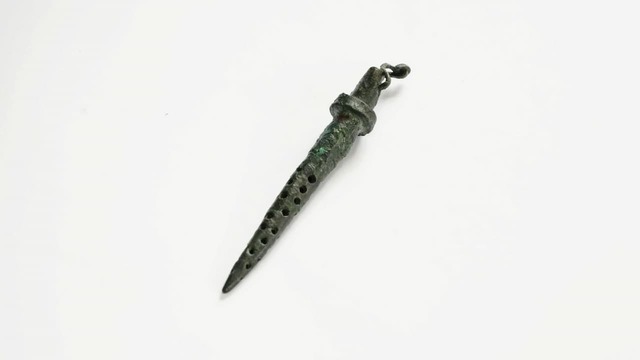
Hadrianopolis: A Hub of Roman and Byzantine Culture
Hadrianopolis was not only an agricultural center but also a vibrant cultural and religious hub. The city’s archaeological landscape includes a wealth of monumental structures, including bathhouses, churches, villas, and temples. These discoveries underscore the significance of Hadrianopolis as a key center of Roman and Byzantine culture. The city’s baths, in particular, are indicative of the importance placed on hygiene and leisure in Roman society, and the presence of religious structures reflects the city’s role as a spiritual center.
The diversity of historical structures found in Hadrianopolis, including fortifications, monumental tombs, and open-air sanctuaries, highlights the city’s importance as a cultural and economic nexus. The city’s ability to thrive as an agricultural, cultural, and religious center is evident in its remarkable archaeological remains, which continue to captivate researchers and visitors alike.
Video
Check out this video to explore 12 fascinating archaeological discoveries from Ancient Rome, offering a glimpse into the empire’s rich history and culture.
Conclusion: Bringing Ancient Practices into Modern Understanding
The discovery of the bronze beverage filter in Hadrianopolis is a reminder of the sophistication and innovation of ancient Roman and Byzantine societies. By uncovering artifacts like the filter, archaeologists are able to provide a more nuanced understanding of daily life in antiquity. The filter, along with other discoveries from Hadrianopolis, paints a picture of a society that was both practical and forward-thinking, using technology to enhance their quality of life and improve their daily habits.
As excavation efforts continue, Hadrianopolis remains an important site for archaeological research, offering valuable insights into the technological, cultural, and social practices of ancient societies. The ongoing work at the site promises to reveal even more fascinating discoveries, further enriching our understanding of the past. The bronze beverage filter is just one example of the many ways in which ancient people demonstrated ingenuity and sophistication in their daily lives, and it serves as a powerful reminder of the enduring legacy of ancient civilizations.

